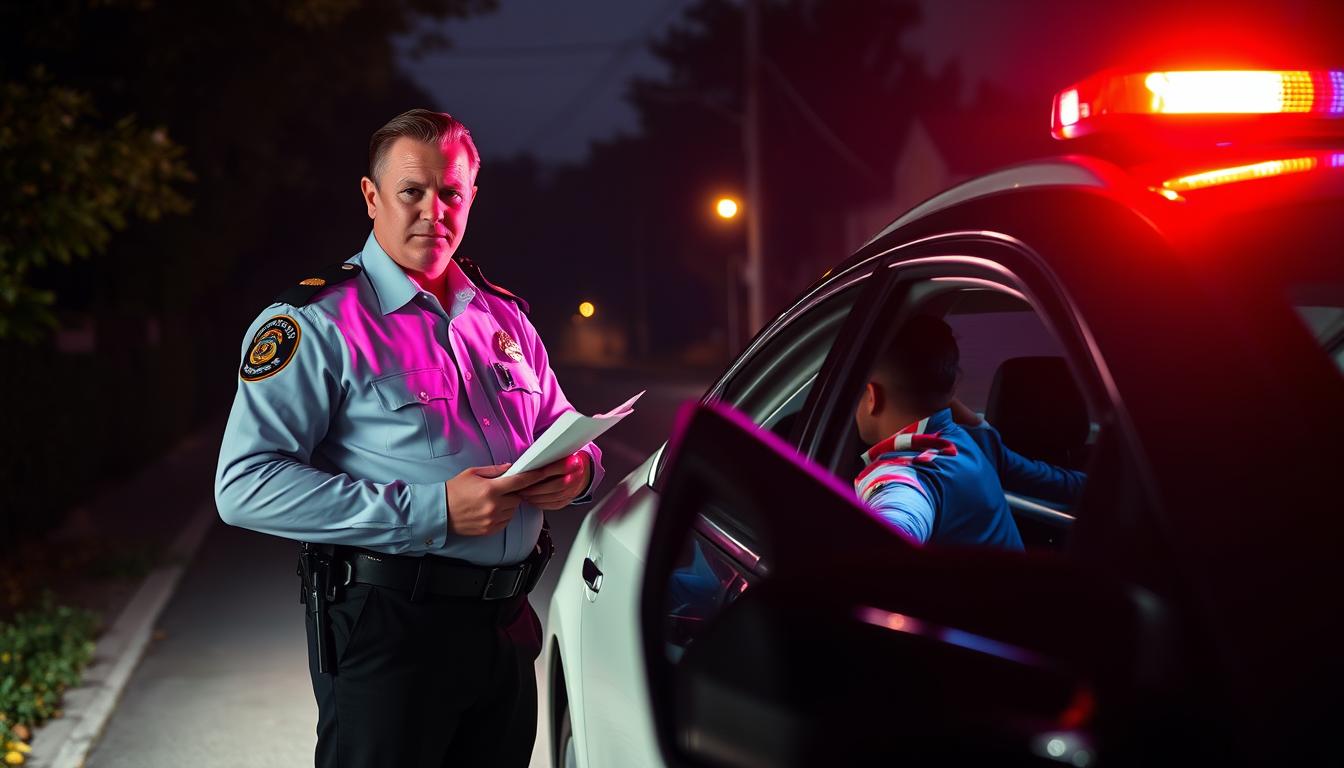Speeding too much can lead to big problems, not just a simple ticket. In the U.S., criminal speeding is a serious crime. It can cause big fines, losing your license, and even jail time.

I’ve seen how bad speeding can be. Criminal speeding laws differ by state. But the main goal is always the same: to keep everyone safe on the roads.
It’s important for drivers to know what criminal speeding is and its legal effects. It’s not just about avoiding a ticket. It’s about understanding the dangers and consequences of speeding.
Key Takeaways
- Criminal speeding is a serious offense with significant legal consequences.
- Laws regarding criminal speeding vary by state.
- Consequences can include fines, license suspension, and jail time.
- Understanding criminal speeding laws is essential for drivers.
- Awareness of the risks associated with speeding can help prevent accidents.
What Is Criminal Speeding?
Criminal speeding is a serious crime that can lead to big legal problems. It’s important to know what it means and why it’s so serious.
Legal Definition and Terminology
Criminal speeding means driving too fast in a way that’s dangerous or reckless. The legal definition can change depending on where you are. But it usually means going over the speed limit in places like school zones or construction areas.
Legal experts say it’s not just about how fast you’re going. It’s also about the danger it poses to others.
How Criminal Speeding Differs from Regular Traffic Violations
Unlike regular traffic tickets, criminal speeding is a more serious crime. It’s often seen as a misdemeanor. This means you could face jail time, fines, and other penalties.
A legal expert notes, “The difference between a traffic ticket and a criminal charge is thin. But the consequences are huge.”
Historical Context of Criminal Speeding Laws
Speeding laws have changed over the years. They’ve gotten stricter as car speeds have gone up and accidents have increased. Today, these laws aim to keep everyone safe by stopping dangerous driving.
A court ruling said, “Criminal speeding laws are not just to punish. They’re to protect the public from reckless driving.”
In summary, criminal speeding is a big deal. It’s not just about speeding. It involves legal, social, and safety issues.
Speed Thresholds That Constitute Criminal Speeding
Criminal speeding laws aim to punish drivers who go too fast. But what speeds are considered too high? The answer changes from state to state.
Absolute Speed Limits vs. Relative Speed Violations
There are two main types of speeding tickets. Absolute speed limits are clear, showing the max speed allowed. For example, if the limit is 65 mph and a driver goes 80 mph, they’ve broken the limit.
Relative speed violations are more complex. They depend on the road conditions. Even if a driver is within the speed limit, they can still get a ticket if their speed is unsafe for the road.
Common Speed Thresholds Across States
Even though specific speeds for criminal speeding differ, some patterns exist. In Arizona, driving more than 20 mph over the speed limit or going over 85 mph is criminal. In California, speeding over 100 mph on highways can also lead to criminal charges.
Knowing these limits is key. The penalties for criminal speeding are serious. They can include big fines, losing your license, and even jail time.
Aggravating Factors That Elevate Speeding to a Criminal Offense
Some factors can turn a speeding ticket into a criminal charge. These include speeding in school zones, construction areas, or with reckless driving. Examples include weaving in and out of lanes or racing.
Speeding in a school zone, where kids are around, is taken very seriously. It’s because it poses a big risk to public safety.
Legal Classification and Charges
It’s important to know how criminal speeding charges are classified. This helps understand how serious the offense is. The classification can change based on where the incident happened and the details of the case.
Misdemeanor vs. Felony Speeding Charges
Criminal speeding can be a misdemeanor or a felony. The type of charge depends on the situation. Misdemeanor speeding charges are for less serious cases where the speed was high but didn’t cause much harm. Felony speeding charges are for more serious cases, like very high speeds or accidents.
Here’s a table showing the main differences between misdemeanor and felony speeding charges:
| Characteristics | Misdemeanor Speeding | Felony Speeding |
|---|---|---|
| Speed Threshold | Typically lower speed thresholds | Extremely high speeds or excessive acceleration |
| Consequences | Fines, possible jail time (usually less than a year), and/or community service | Significant fines, longer jail time (potentially several years), and/or probation |
| Aggravating Factors | Fewer or less severe aggravating factors | Presence of aggravating factors such as accidents, endangering others, or reckless behavior |
Criminal Speeding in Relation to Reckless Driving
Criminal speeding is linked to reckless driving. Both involve dangerous driving. Criminal speeding focuses on the speed, while reckless driving is about ignoring safety. In many places, speeding is part of reckless driving charges.
How Prosecutors Approach Criminal Speeding Cases
Prosecutors look at the evidence when dealing with criminal speeding. They check speed data, witness statements, and video footage. They also look at the driver’s history and the impact on safety.
Prosecutors might offer plea deals or consider special programs. This depends on the case and the defendant’s past.
Consequences and Penalties
Being charged with criminal speeding can have big consequences. The penalties aim to stop reckless driving and keep everyone safe. It’s important to know what these consequences are if you’re facing charges.
Monetary Fines and Court Costs
One of the first things you’ll face is fines and court costs. These can be very high, sometimes over $1,000. This can really hurt your finances.
License Suspension or Revocation
Another big penalty is losing your driver’s license. How long you lose it depends on where you live and the details of your case. Not being able to drive can make everyday life hard.
Possible Jail Time and Probation
In serious cases, you might even go to jail. Not everyone does, but it’s a possibility. Or, you could get probation, which means regular meetings with a probation officer. Either way, it can change your life a lot.
Impact on Insurance Rates and Points Systems
Getting caught for criminal speeding can also raise your insurance rates. Many places use a points system for speeding. Too many points can mean more penalties, like losing your license. Your insurance might go up by 50% or more.
Long-Term Effects on Driving Record
Lastly, a criminal speeding conviction can affect your driving record for years. In many places, it stays on your record for a long time. This can hurt your job chances, insurance rates, and even your ability to get certain licenses.
“A criminal speeding conviction can follow you for years, impacting various aspects of your life.”
It’s crucial to think about these long-term effects when facing criminal speeding charges.
Criminal Speeding Laws by State
Looking at criminal speeding laws across states shows no single rule fits all. Each state has its own laws, based on local needs, road conditions, and driving culture.
Western States: Arizona, California, Colorado, and Oregon
In the West, states like Arizona, California, Colorado, and Oregon have different rules. For example, California is strict, with speeding over 100 mph being a misdemeanor. This can lead to higher fines and jail time.
Arizona is also strict, with laws that allow for aggressive enforcement. There’s debate on increasing penalties for repeat offenders or using more speed monitoring.
Southern States: Texas, Florida, Georgia, and Tennessee
In the South, states like Texas, Florida, Georgia, and Tennessee have their own rules. For instance, in Texas, speeding is considered reckless and can lead to misdemeanor charges. In Florida, speeding more than 30 mph over the limit is a crime, aiming to reduce dangerous driving.
“Speeding is a serious offense that can have devastating consequences. It’s crucial for drivers to understand the laws and the potential penalties associated with criminal speeding.” – National Highway Traffic Safety Administration
Northeastern States: New York, Massachusetts, and Maine
In the Northeast, states like New York, Massachusetts, and Maine have their own ways of handling speeding. New York has strict laws, with speeding tickets often leading to more penalties. The state also focuses on driver education to reduce speeding.
| State | Speed Limit for Criminal Speeding | Typical Penalties |
|---|---|---|
| Arizona | 85+ mph | Fines, potential jail time |
| California | 100+ mph | Misdemeanor charges, fines, jail time |
| Texas | Varies by jurisdiction | Misdemeanor charges, fines |
| Florida | 30+ mph over limit | Criminal charges, fines, potential jail |
Midwestern States: Ohio, Illinois, Michigan, and Wisconsin
The Midwest, including Ohio, Illinois, Michigan, and Wisconsin, has its own rules. For example, Illinois classifies speeding as a crime under certain conditions, like speeding in a school zone.
Variations in State Enforcement Practices
While laws set the rules, how they’re enforced varies a lot. This depends on local policies, resources, and community views. Some states use cameras, while others rely on police.
Knowing these differences is key for drivers to follow the law and avoid serious penalties. By staying informed, drivers can comply with state laws and stay safe.
The Legal Process After a Criminal Speeding Charge
A criminal speeding charge starts a legal journey that needs careful steps and smart choices. Knowing what happens next can help you get ready and make good decisions.
Traffic Stop and Initial Citation
The first step is a traffic stop, where an officer gives you a citation for speeding. This moment is key because it starts the legal process. It’s important to listen to the officer and remember the details of the citation.
Arrest and Booking Procedures
Sometimes, a speeding charge can lead to arrest and booking. This means you’ll be taken into custody, fingerprinted, and your personal info will be recorded. Knowing your rights during this time is crucial.

Court Appearances and Hearings
Court appearances are a big part of the legal process. If you’re charged with criminal speeding, you’ll need to go to hearings. Being ready for these, with legal help if you need it, is important for a good outcome.
Potential Plea Bargains and Negotiations
Plea bargains might be an option, depending on your case. This means talking with the prosecution to possibly lower charges or penalties. Knowing about plea bargains and negotiations can greatly affect your case.
Important things to think about during the legal process include:
- Getting legal help to understand the case.
- Knowing the possible effects of a speeding conviction.
- Being ready for court and any negotiations.
By being informed and prepared, you can handle the legal steps after a criminal speeding charge better.
Defending Against Criminal Speeding Charges
When you face criminal speeding charges, it’s key to look at different defense strategies. A strong defense can really change the outcome of your case.
Challenging Speed Detection Methods and Equipment
One good way to defend against criminal speeding charges is to question the speed detection methods and equipment. This could be about the accuracy of radar guns or LIDAR devices. For example, a study by the National Highway Traffic Safety Administration found some radar guns might not be accurate under certain conditions. Challenging the reliability of speed detection equipment is a key part of your defense.
Questioning Officer Procedures and Training
Another strategy is to question the training and procedures of the officers who gave you the ticket. This could be about if the officer followed the right steps when using speed detection tools. The International Association of Chiefs of Police says, “proper training is key to ensure officers can accurately use speed measurement devices.” Pointing out any training or procedure issues can make your defense stronger.
Necessity and Emergency Defenses
In some cases, you might have a necessity or emergency defense. This means you were speeding because of an emergency or to avoid a bigger problem. For example, speeding to avoid a crash or to get medical help fast. A legal expert says, “a necessity defense can be used when the defendant believes their actions were necessary to avoid a greater harm.”
“The necessity defense is not just for life-threatening situations; it can also apply to situations where the defendant is trying to prevent significant harm.”
When to Hire an Attorney vs. Self-Representation
Choosing whether to hire an attorney or represent yourself is a big decision. While doing it yourself might save money, it’s usually better to get professional help for criminal speeding charges. An experienced attorney can offer valuable advice and help you understand the law. The American Bar Association says, “having competent legal representation can greatly affect the outcome of your case.”
Traffic School and Diversion Programs
Some places offer traffic school or diversion programs instead of regular penalties. These programs can lessen the impact of a criminal speeding charge. By taking a traffic safety course or diversion program, you might be able to reduce or get rid of the charges. It’s important to talk to your attorney about these options to find the best choice for your situation.
Long-Term Implications of a Conviction
A criminal speeding conviction can affect many areas of your life. It’s important to know how it can impact you.
Criminal Record Concerns
A criminal speeding conviction leaves a permanent mark on your record. This can be a big worry. It might be seen by employers, schools, and others.
Employment and Professional License Impacts
Many jobs require background checks. A criminal record can make it hard to find work. It’s even tougher if driving is a big part of the job. Also, you might lose your professional licenses.

International Travel Restrictions
Some countries won’t let people with criminal records in. A speeding conviction could stop you from traveling abroad. This affects both your personal and work trips.
Options for Expungement or Record Sealing
In some places, you can get your record expunged or sealed after a while. This can lessen the effects of a conviction. It limits who can see your record.
Knowing the long-term effects of a speeding conviction is key. It helps you make smart choices. Talking to a lawyer can guide you on what to do next.
Conclusion
Criminal speeding is a serious crime with big consequences. The laws and penalties for it vary by state. But, knowing these laws is always important.
Speeding is not just a small traffic ticket. It can change your life, leading to big fines, losing your license, and even jail. These harsh penalties show how critical it is to know the laws to stay safe.
As a driver, knowing the speed limits and what makes speeding a crime in your state is key. Being informed helps you make safer choices on the road. This way, you can avoid the severe penalties of criminal speeding.
In short, knowing the laws about criminal speeding is vital for all drivers. By staying informed and avoiding speeding, you keep yourself and others safe on the road.
FAQ
What is considered criminal speeding?
Criminal speeding is driving too fast. This is usually over 85 mph on highways or 35 mph in neighborhoods. It can lead to big fines, losing your license, and even jail time.
What is the difference between criminal speeding and a regular traffic violation?
Criminal speeding is a serious crime. It’s not just a regular traffic ticket. It can be a misdemeanor or felony, depending on where you are and the situation.
What are the consequences of a criminal speeding conviction?
Getting caught for criminal speeding can cost a lot. You might face big fines, lose your license, and even go to jail. You could also get probation, see your insurance go up, and get points on your license.
Can I fight a criminal speeding charge?
Yes, you can fight a criminal speeding charge. You can question how fast you were going, the police’s methods, and if you had a good reason to speed. It’s smart to get a lawyer to help you.
How do criminal speeding laws vary by state?
Criminal speeding laws change from state to state. Each place has its own speed limits, fines, and rules. It’s important to know the laws where you live.
What are the long-term implications of a criminal speeding conviction?
A criminal speeding conviction can affect your life for a long time. It can hurt your driving record, job chances, professional licenses, and even travel plans. It’s important to think about these long-term effects.
Can a criminal speeding conviction be expunged or sealed?
It might be possible to clear or seal a criminal speeding conviction. But, it depends on where you are and the rules. It’s best to talk to a lawyer to see if you can.
What should I do if I’m charged with criminal speeding?
If you’re charged with criminal speeding, first understand the charges. Then, get advice from a lawyer. Be ready for court and possible deals.
How can I avoid a criminal speeding charge?
To avoid a criminal speeding charge, know and follow speed limits. Adjust your speed for the road and drive carefully. Be extra careful in areas with lots of people or construction.
